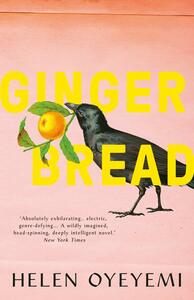You need to sign in or sign up before continuing.
Take a photo of a barcode or cover
I’ve gone with 3 stars for this, though the sheer beauty of Oyeyemi’s writing deserves all the stars. Stunning prose aside, I didn’t enjoy reading this, and finishing it felt like a battle of wills between me and the book’s meandering tale. It rings with intelligence and I love a good original fantastical story, but I felt like I didn’t know what was going on for half of it and I finished it feeling deflated. Maybe I missed something? There is striking and beautiful allegory at points but I think my frustration was that no one character was really truly fleshed out, and I didn’t have an emotional tie to any of them. It left me wanting to reach for some David Mitchell instead.
adventurous
dark
funny
mysterious
reflective
medium-paced
It’s a 3.5 but I’m rounding up for vindication purposes!! This does not deserve such a low rating!!
This book was so disappointing. I loved Boy, Snow, Bird and had high expectations for this story. Unfortunately it uses novelty as plot and mistakes invention for meaning. The images are often stunning but they don't add up to anything. The book is the equivalent of a long rambling bedtime story that someone keeps adding to without caring how one section connects to another. On top of that, the entire book is a backstory about people you've yet to care about. Twee, rambling, boring.
hopeful
medium-paced
The original hardback cover for this book was one of the most beautiful I've ever seen (a wishing well in a wood) but it implied the story was a re-telling of a fairy tale - which it isn't - and that's why the reviews are mixed. Gingerbread is one of those novels where the author leaves you wondering if this a tale of magic, or a modern fable (referencing Brexit, people trafficking and immigration), or entirely in the heroine's mind. Even after finishing it, I'm still not certain!
Gingerbread is a story within a story. Harriet Lee lives at the top of a London tower block (the tallest tower of fairy tales) with her teenage daughter Perdita. Harriet is hard-working, practical and kind. She tries very hard to be accepted by the Parents' Association at Perdita's school, even baking them her 'famous' gingerbread. But all her attempts - and her gingerbread - are rejected. Then Perdita is rushed to hospital. While Harriet waits for her daughter to recover, Perdita insists that Harriet tells her the true story of where they came from and who her father is - because Harriet's homeland, Druhástrana, does not appear on any map...
The best part of Gingerbread is the very clever writing. Other books may contain ten brilliant lines in all; in Gingerbread there are ten brilliant lines on almost every page. The story is a very slow burn. Every character, even the minor ones, have lengthy backstories and the story meanders about, but there is humour and a tiny bit of romance, and some parts are truly magical. I loved the description of Harriet's flat and Perdita's dolls. Another favourite bit was where Harriet went to live with the Kerchevals and met Perdita's father. I wasn't so keen on the gingerbread theme park!
You have to be the kind of reader who enjoys long books with lots of detail, a clever turn of phrase, and the ability to enjoy a good story without thinking about the logic of it too much. You can think about that after you've finished it! The only book I can think of that's vaguely similar is Life of Pi - a fantastical story-within-a-story of one person's life. If you're looking for a retelling of Hansel and Gretel, you will be disappointed - even though there actually is a character called Gretel!
Thank you to Helen Oyeyemi and Picador (Pan Macmillan) for my copy of this book, which I requested via NetGalley and reviewed voluntarily.
Gingerbread is a story within a story. Harriet Lee lives at the top of a London tower block (the tallest tower of fairy tales) with her teenage daughter Perdita. Harriet is hard-working, practical and kind. She tries very hard to be accepted by the Parents' Association at Perdita's school, even baking them her 'famous' gingerbread. But all her attempts - and her gingerbread - are rejected. Then Perdita is rushed to hospital. While Harriet waits for her daughter to recover, Perdita insists that Harriet tells her the true story of where they came from and who her father is - because Harriet's homeland, Druhástrana, does not appear on any map...
The best part of Gingerbread is the very clever writing. Other books may contain ten brilliant lines in all; in Gingerbread there are ten brilliant lines on almost every page. The story is a very slow burn. Every character, even the minor ones, have lengthy backstories and the story meanders about, but there is humour and a tiny bit of romance, and some parts are truly magical. I loved the description of Harriet's flat and Perdita's dolls. Another favourite bit was where Harriet went to live with the Kerchevals and met Perdita's father. I wasn't so keen on the gingerbread theme park!
You have to be the kind of reader who enjoys long books with lots of detail, a clever turn of phrase, and the ability to enjoy a good story without thinking about the logic of it too much. You can think about that after you've finished it! The only book I can think of that's vaguely similar is Life of Pi - a fantastical story-within-a-story of one person's life. If you're looking for a retelling of Hansel and Gretel, you will be disappointed - even though there actually is a character called Gretel!
Thank you to Helen Oyeyemi and Picador (Pan Macmillan) for my copy of this book, which I requested via NetGalley and reviewed voluntarily.
I really wanted to like this book, but I was actually pretty frustratedby it. I'm not sure if it was all the abrupt, untethered sentences, or the strangely-interesting but kind of meandering storyline, or the overall feeling that the author was trying dearly to sound strange and whimsical but instead made things confusing. I never got a good sense of the characters, despite many clever-sounding descriptions, and I never got a good sense of when or where or why. If this was intended to be a fairy tale, it's a rambling one.
Strange, inspired by fairy tales, and overly long novel about cursed gingerbread that's both an allegory for feminism and also a vexing challenge for me to finish. I loved Oyeyemi's 'Boy, Snow, Bird' novel, but I didn't connect as well with 'Gingerbread.'
Wow I missed something here. I plodded through thinking surely it would all make sense further in. Nope. Bizarre, fairy tale-ish read. At one point I thought maybe I needed to be high to fully “get it”.





